- Home
- Keith R. A. DeCandido
I.K.S. Gorkon Book One: A Good Day to Die Page 2
I.K.S. Gorkon Book One: A Good Day to Die Read online
Page 2
“Stand down, Toq,” Klag said. “Any challenge will be mine to make—and I will not take up arms against my brother here.”
Both Toq and B’Oraq shot him a look.
Ignoring the look, Klag turned back to his younger sibling. “Again I ask you, Dorrek, why are you here? Surely, you have not come to wish your older brother well on his induction into the Order.”
Dorrek looked up at Klag with his small, beady eyes, a direct contrast to Klag’s wide ones. Dorrek had inherited his mother’s crest, where Klag had gotten M’Raq’s. The only obvious family resemblance between the two was in the sharply upturned eyebrows. “Believe me, brother, I would not have set foot on this planet knowing it had been sullied by your bootprints were I not ordered to. All the Chancellor-class captains have been summoned here to meet with Chancellor Martok and General Talak following the ceremony.”
Klag had not known this—but his induction made his presence on Ty’Gokor a given, so such orders would not need to be cut for him. Instead, he simply sneered at Dorrek. “You accuse me of soiling this world, yet you stood by and allowed Father to wither away and die like some old woman! You supported his honorless path.”
“He was our father. It was our duty to obey him. But that was never good enough for you, was it, Klag?”
“Ironic, is it not,” Klag said with a smile, “that you hide behind filial piety when it suits your purpose, yet you make no such concession to me now, even though I am the older brother?”
Dorrek let out a growl. “Our father earned the right to be obeyed!”
“How? By allowing himself to be captured? By letting the Romulans prevent him from dying with honor? By refusing to reclaim that honor when he escaped from the prison camp? When, exactly, did he earn that right, Dorrek?”
Stepping forward, Dorrek started to speak, then stopped. “I will not do this now, Klag. Not here. This is a time of celebration, and I will honor those—most of those—who are to be inducted tomorrow. But know this—there is blood between us, and it will not end until one of us is in Gre’thor.”
With that, Dorrek turned his back on Klag and disappeared into the ever-growing crowd of warriors.
Klag looked around for the first time since Dorrek’s arrival. Grakal, B’Edra, and the others had disappeared into the crowd as well. Only B’Oraq and Toq remained by Klag’s side.
Cursing, Klag scooped up some more bloodwine and drank it all in one gulp.
“Captain—” B’Oraq started.
“Be silent! We will not speak of this. We will drink and we will tell stories and we will sing songs of glory and battle and honor!”
Both officers exchanged a quick glance, then refilled their mugs.
Klag knew that both of them had questions, and he also knew that he had their support.
But right now, he wanted more than anything else to get excessively drunk.
Hours later, dawn rose on Ty’Gokor. At least, Klag assumed it did. The Hall of Warriors was enclosed, with no view of the outside world. All one could see in this place was history: that of the past, represented by the statues that gazed down upon all who entered, and that of the future, in the form of those who would be inducted into the Order.
Klag didn’t feel nearly drunk enough.
B’Oraq, too, seemed maddeningly sober. Klag hadn’t seen Toq in close to an hour, though he had looked very close to falling over then. The youth had last been seen standing with Grakal under the statue of Dahar Master Kor. Grakal had been telling Toq the story of the Battle of Klach D’Kel Brakt for the fifth time.
Klag had not seen hide nor hair of B’Edra—which disappointed him—nor Dorrek—which was a relief—all night. He wondered if the Taj’s captain had thought his treatment of his father to be distasteful.
He also wondered why he cared so much. Far too much of his life of late had been dictated by the whims of others. Kargan’s influence kept him away from command for years. Kargan’s death and Klag’s own heroism at Marcan V had given him a command, but then only on others’ terms. He had had no say in his crew.
But they had come together, won many campaigns, from the rebellion on taD to the defeat of Malkus at Narendra III, and it was all Klag’s doing. I have done this—I have at last brought honor to our House, after Father threw it away and after Kargan kept me from fulfilling it properly. Now, at last, I am to be inducted into the Order of the Bat’leth! And no one will take that from me!
“Take what from you, Captain?” B’Oraq asked.
“Hm?” Klag hadn’t realized he’d spoken aloud. “Nothing, nothing.” He took a sip of his bloodwine, but the mug was empty. Looking down, he saw that the barrel too was empty. “QI’yaH, ” he cursed.
“Have you seen Toq?” she asked.
“Not since—” He cut himself off as he looked around. His eyes fell on the statue of Kor. Sculpted shortly after Kor’s heroic death on the I.K.S. Ning’tao, it showed Kor as a younger man, leaning forward, each arm outstretched with a disruptor in each hand.
It looked almost the same as it did the last time Klag saw it, with one major alteration: Toq, who was now draped over the Dahar Master’s arms, sleeping peacefully.
B’Oraq followed Klag’s gaze, and then both captain and doctor burst into raucous laughter, Klag throwing his head back and bellowing his amusement to the ceiling.
It was the first real belly laugh Klag had indulged in since Dorrek had shown his hideous face, and it felt good.
“I’m reminded,” B’Oraq said, “of a human saying I picked up at Starfleet Medical Academy. ‘Youth is wasted on the young.’ ”
“Humans have almost as many sayings as we do.”
“Yes, but ours are much more colorful. And most of theirs are from the great playwright Shakespeare, in any case.”
Klag shook his head. “I always found Shakespeare to be overrated.”
B’Oraq tugged on her braid. “You can’t really appreciate him until you read him in the original English.”
Their conversation was interrupted by cheers that heralded the arrival of General Talak, Chancellor Martok’s chief of staff. This meant that Martok himself could not be far behind.
However, another entered behind Talak: a Klingon, but not dressed in a Defense Force uniform. Rather, he wore a brown tunic, matching pants, and a black leather floor-length coat that bore the insignia of both the United Federation of Planets and the Klingon Empire on the chest.
“Captain, isn’t that Ambassador Worf?” B’Oraq said.
Klag did not answer directly, but instead cried out, “Worf!”
The ambassador looked up and around the room at the sound of his name. Upon spying Klag and B’Oraq, he changed direction and went to greet them.
“What brings the Federation ambassador to our hallowed hall?” Klag asked when Worf was in conversational earshot.
Worf was far too taciturn to ever truly smile—a lifetime living among fragile humans had, Klag knew, taught the ambassador to restrain his Klingon passion—but he did smirk with pride as he answered. “The same as you, Captain. Chancellor Martok has added my name to the honor roll.”
Klag nodded his approval. Worf had been involved in both Klag’s mission to taD and his recent victory on Narendra III, and he had been a hero to the Empire in more ways than one. “The chancellor is wise. Though some may see this as a political move on his part.”
“The irony is not lost on me,” Worf said dryly.
“What irony?” B’Oraq asked.
“Twice,” Klag said, enjoying the chance to tell another story, “the ambassador was cast out of the Empire. The first was when he accepted discommendation in order to keep the Empire from civil war. He did so to protect the secrets of the traitorous House of Duras. The second was when he opposed the Klingon invasion of Cardassia—an invasion masterminded by the changeling who impersonated Martok.”
“In both cases,” Worf said, “the reasons for my exile were political. This time, however, it is truly only honor being served.”
Worf nodded. “I’d like that—but only if we drink to yours, as well, Klag.”
Klag laughed. “It will be done!”
Within the hour, Klag had drunk six more mugs of bloodwine. The air felt stale, reeking with the musk of the assorted drunken Klingons, tinged with the overwhelming smell of the bloodwine, which now seemed to permeate every molecule that made up the hall.
Yet he felt more sober than ever. Klag, Worf, and B’Oraq exchanged more stories, with some other warriors coming and going—including Grakal, who had some disparaging remarks to make about Toq’s constitution. Worf told of his capture by the Breen during the war, and his escape, aided by the Cardassian hero Damar. Klag told of the Pagh’s campaigns against the Cardassians, including a well-fought battle at Quinor. Grakal finally told a story of his own, about taking Chin’toka—he had served as a lieutenant on the Azrak during that glorious battle.
“I remember Chin’toka well,” Worf said somberly. “It was the site of one of our greatest victories, and one of our greatest defeats. We lost the Defiant there when—”
A bone-jarring pounding started then. It turned out to be the drums that loudly heralded the entrance of the chancellor. Martok was covered neck to toe in the heavy medal-covered cassock that signified his most high office. Behind him, a bearer held an ornate bat’leth. Klag saw that, rather than carry the weapon that had been the symbol of the Order for decades, Martok had instead brought with him the Sword of Kahless. Retrieved by Martok and Worf shortly after the end of the war, possession of the legendary sword, forged by the divine one himself, had cemented Martok’s power as head of the High Council.
“Mar-tok! Mar-tok! Mar-tok!”
The cheer started with one warrior, then grew to fifty by the third repetition of the name. Klag had mixed opinions of the Empire’s newest leader, but he knew that the one-eyed warrior was a distinct improvement on his predecessor, the ever-political Gowron. Martok was a commoner from the Ketha Lowlands who worked his way up the ranks to become a great war hero. In truth, he embodied the best of the Empire, so it was only fitting that he occupy its highest position. His road there had been hard-fought, but in the end, he had more than earned it.
“Mar-tok! Mar-tok! Mar-tok!”
As the chancellor stepped up to the stage, all the warriors who still stood turned toward him, cheering and drinking. Klag found himself joining them, as did B’Oraq and Worf.
General Talak stood next to the chancellor and cried, “Long live Martok! Long live the Empire!”
A general cheer rose up at that, some shouting Martok’s name, some shouting “Qapla’!” and others just shouting. As they did so, two more Klingons wheeled a large board onto the stage. Attached to the board were about a dozen medals: the symbols of the honor that would be bestowed this day.
“Klingon warriors, I salute you!” Martok shouted over the din, his words serving to quiet that din somewhat. “At least, those of you still standing,” he added with a laugh, as three unconscious warriors were carried out of the hall. Klag looked over at the statue of Kor to see that Toq had not been moved, nor had the boy budged on his own.
“This is a great day. A day when we honor those who have brought us glory, whose deeds will live on in song and story! And so, in this hallowed hall under the watchful gaze of our greatest heroes, you will receive the highest honor that can be given to a Klingon!”
More cheers went up at that, and Klag prepared himself to go forward.
But, though tradition stated that the chancellor’s adjutant—in this case, Talak—would then read the honor roll, the general did not budge. Instead, Martok gazed out upon the crowd with his one eye and waited for the warriors to quiet down.
“Most of you,” he finally said, “know the Order only as a great honor that we bestow. This night has been full of stories of our courage, our bravery, our honor, so I hope that you will allow me to tell one final tale. That of how the Order was founded.”
Klag exchanged a glance with Worf. This was not a normal part of the ceremony. The ambassador simply nodded back at Klag. Obviously, Worf, a member of Martok’s House, knew what was coming.
“The Order was formed over a millennium ago by Kahless’s mate, Lukara, after his ascension. Kahless’s divine wisdom was evident when coming from the lips of Kahless himself. Lukara was understandably concerned with whether or not her mate’s words would live on after him. For conquest is only the beginning of the battle, not the end. As Kahless himself said, ‘Power must not only be seized, but also held.’ ”
Interesting, Klag thought. He knew some of this history, but had never given it much thought. Most of the stories about Kahless focused on his life, not what happened after his ascent to Sto-Vo-Kor.
Martok now began to pace, speaking with the cadences and rhythms of a born storyteller, being sure to make eye contact with as many of the warriors in the room as he could. “And so Lukara formed the Order of the Bat’leth from among Kahless’s most trusted followers.” Walking over to the sword-bearer, Martok took the Sword of Kahless from him and held it aloft. “Named after the very sword that Kahless forged in the lava of the Kri’stak Volcano, the Order was tasked not only with spreading the great word of Kahless, but also enforcing his doctrine. If a House Head was acting dishonorably, members of the Order would be sent to put him on the right path. If a warrior went back on his word to an honorable foe, the Order would ensure that he kept that word.”
“The Knights Templar,” Worf whispered.
“A not inappropriate analogy,” B’Oraq muttered in reply.
Klag gave them both odd looks, then remembered that they both studied at Starfleet Academy. No doubt it is some similar Federation organization.
Certainly, Klag knew, the Order had long since fallen away from that particular duty. Although receiving the medal that signified membership in the Order was a great honor, it had never, to the best of Klag’s knowledge, come with any special responsibility. It was but an acknowledgment of great deeds.
The inebriated, exhausted, yet exuberant crowd started to voice its pleasure with cheers and cries of “Mar-tok!”
Martok lowered the sword and continued. “Although no one has called upon the Order to serve their original function for many turns, that does not relieve any of you who are to be inducted today from your duty. You must be ever vigilant.”
The crowd cheered its approval.
“You must live up to the ideals of Kahless!” Martok raised his voice to continue to be heard over the swelling noise of the crowd. “And, should the need arise, you must call upon the Order to aid you in restoring honor to any part of the Empire! We are but a few months removed from one of the greatest victories in history. The war against the Dominion was on a scale not seen in this galaxy for millennia, and we were the victors!”
More cheers. Klag was not among them, but he did smile his approval. There were always those who would abandon the course of honor. Martok had had to deal with such creatures shortly after the end of the war. Klag was pleased to see that Martok had learned the lessons those battles had taught him and was preparing for potential future lapses.
“And so,” Martok said, holding the sword back up, “let us go to glory!”
This time, Klag did join in the cheers. The sound echoed throughout the chamber, rising to a pitch so deafening Klag feared his eardrums would burst.
Talak stepped forward, holding a padd. “Come forward, Hevna, daughter of Larra.”
Klag saw a woman approach the stage, a mek’leth in one hand, even as Martok reached onto the board to remove one of the medals. Proudly, Hevna stood as Martok pinned the medal onto her uniform. “Glory to you and your House,” he said.
Nodding, she turned and returned triumphantly to her place, where she was greeted enthusiastically.
“Come forward, Grakal, son of Kerr.”
Grakal stumbled toward the stage,
barely able to keep to his feet. A pity Toq is not awake to see the tables turned, Klag thought wryly.
“Glory to you,” Martok said as he steadied the drunken warrior with one hand while pinning the medal with another, “and your House.”
After nodding, Grakal turned around, and proceeded to pass out, falling down the stage stairs.
This provoked gales of laughter from many of those assembled, Martok most of all. “How fortunate for Grakal,” the chancellor said, “that tradition states that one must remain conscious until receiving the medal.”
Klag threw his head back and laughed at the chancellor’s remark, as well as its victim, even as he, Worf, and B’Oraq moved to help remove the insensate commander from blocking the stairs.
Once they had done so, Talak said, “Come forward, Worf, son of Mogh.”
Turning, Klag saw the ambassador turn and walk to the stage. The cheers that met his announcement were at the same volume as the cheers for the other warriors, but Klag noted that they came from fewer mouths. Many thought Worf to be a hero to the Empire. He slew the traitor Duras; he killed Chancellor Gowron in honorable combat and installed Martok as his successor; he was the one who first saw the clone of Kahless on his manufactured return to Boreth, and his actions led to the clone’s rise to the position of emperor. Others thought less of him for those very deeds—or they viewed him as an outsider because of his Federation citizenship. Some simply were unaware of Worf’s role in those events, for others—primarily Gowron—had taken public credit for them.
However, Klag was sure to join in the cheers. Worf had overcome much, from the massacre of his family on Khitomer to Gowron’s treachery, and he deserved the praise he received now. Klag had fought alongside him twice, and found him to be a true warrior and worthy of the honor Martok bestowed upon him.
Martok smiled as he placed the medal on Worf’s heavy leather jacket. “Glory to you,” he said, “and our House. This is a long time coming, my friend.”
Worf simply nodded and turned around. Next to Klag, B’Oraq—who had remained quiet for most of the ceremony—cheered as loudly as she could for the ambassador.

 Alien
Alien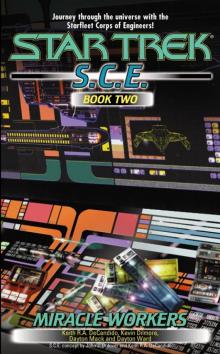 Miracle Workers
Miracle Workers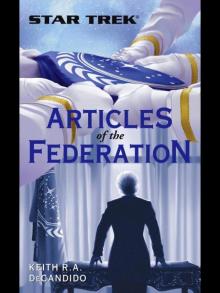 Articles of the Federation
Articles of the Federation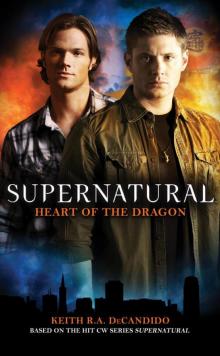 Supernatural Heart of the Dragon
Supernatural Heart of the Dragon War Stories: Book Two
War Stories: Book Two The Zoo Job
The Zoo Job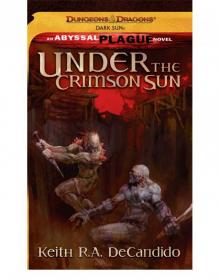 Under the Crimson Sun
Under the Crimson Sun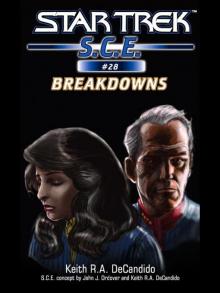 Breakdowns
Breakdowns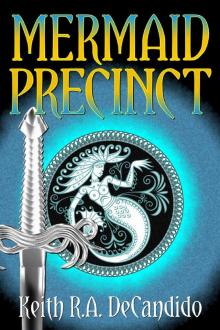 Mermaid Precinct (ARC)
Mermaid Precinct (ARC)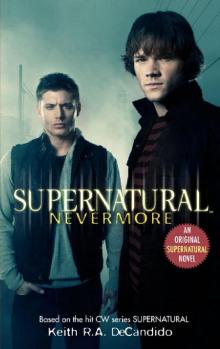 Supernatural 1 - Nevermore
Supernatural 1 - Nevermore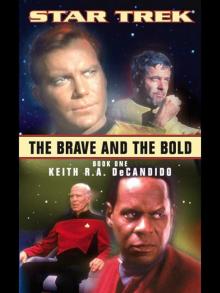 STAR TREK - The Brave and the Bold Book One
STAR TREK - The Brave and the Bold Book One Four Walls
Four Walls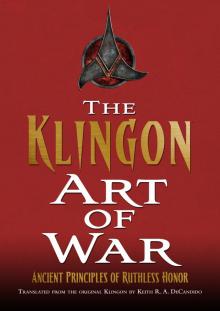 The Klingon Art of War
The Klingon Art of War Blackout
Blackout War Stories: Book One
War Stories: Book One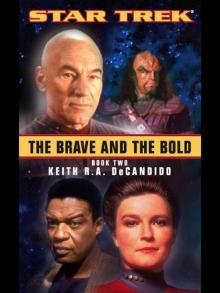 The Brave and the Bold Book Two
The Brave and the Bold Book Two Honor Bound
Honor Bound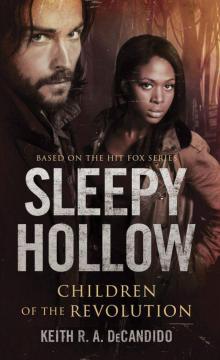 Sleepy Hollow: Children of the Revolution
Sleepy Hollow: Children of the Revolution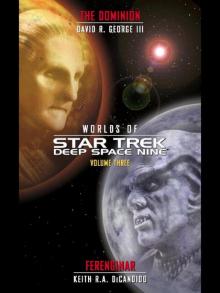 Worlds of Star Trek Deep Space Nine® Volume Three
Worlds of Star Trek Deep Space Nine® Volume Three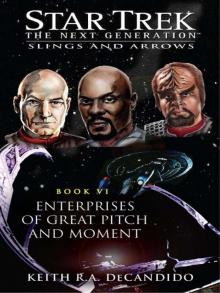 Star Trek: TNG: Enterprises of Great Pitch and Moment
Star Trek: TNG: Enterprises of Great Pitch and Moment Genesis
Genesis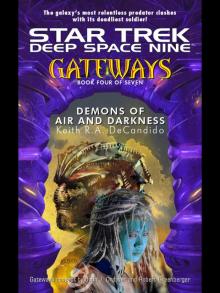 Demons of Air and Darkness
Demons of Air and Darkness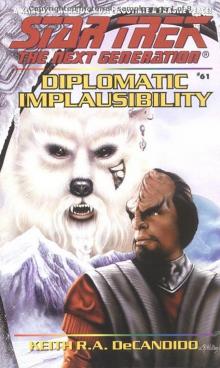 Star Trek - TNG - 61 - Diplomatic Implausibility
Star Trek - TNG - 61 - Diplomatic Implausibility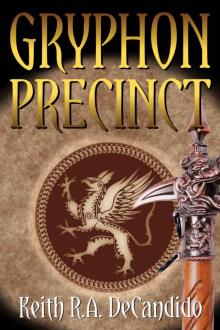 Gryphon Precinct (Dragon Precinct)
Gryphon Precinct (Dragon Precinct)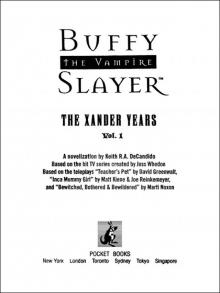 THE XANDER YEARS, Vol. 1
THE XANDER YEARS, Vol. 1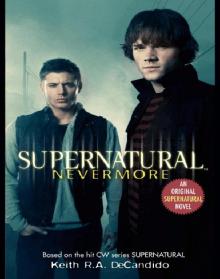 Nevermore
Nevermore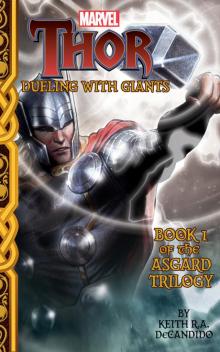 Thor
Thor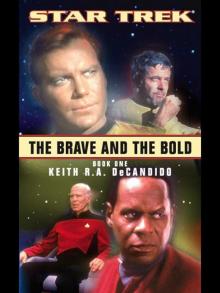 The Brave And The Bold Book One
The Brave And The Bold Book One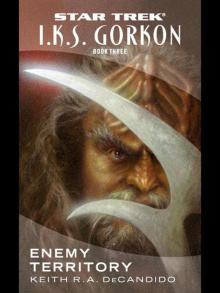 I.K.S. Gorkon Book Three
I.K.S. Gorkon Book Three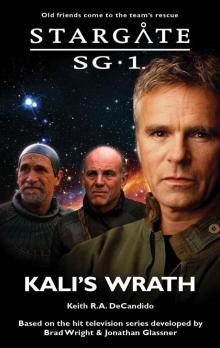 STARGATE SG-1: Kali's Wrath (SG1-28)
STARGATE SG-1: Kali's Wrath (SG1-28)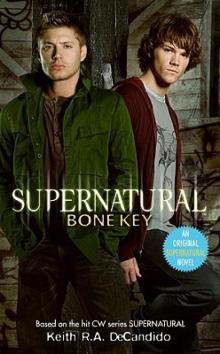 Bone Key
Bone Key Guilt in Innocece
Guilt in Innocece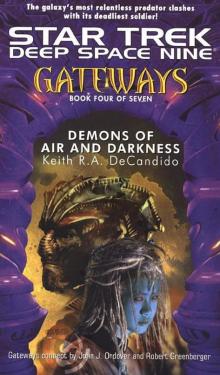 Star Trek - DS9 Relaunch 04 - Gateways - 4 of 7 - Demons Of Air And Darkness
Star Trek - DS9 Relaunch 04 - Gateways - 4 of 7 - Demons Of Air And Darkness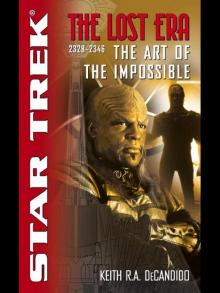 The Art of the Impossible
The Art of the Impossible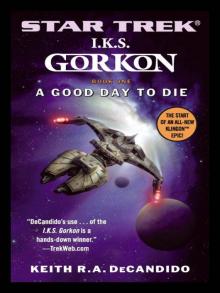 I.K.S. Gorkon Book One: A Good Day to Die
I.K.S. Gorkon Book One: A Good Day to Die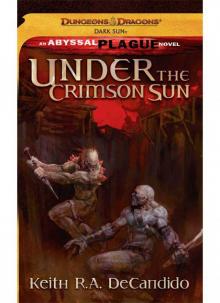 Under the Crimson Sun (the abyssal plague)
Under the Crimson Sun (the abyssal plague)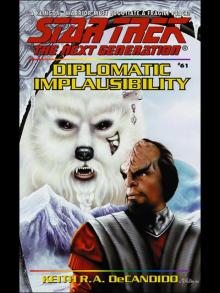 DIPLOMATIC IMPLAUSIBILITY
DIPLOMATIC IMPLAUSIBILITY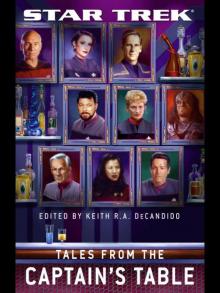 Tales from the Captain's Table
Tales from the Captain's Table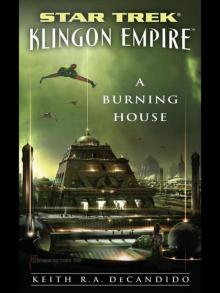 A Burning House
A Burning House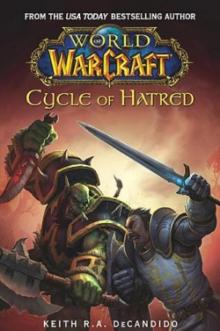 Cycle of Hatred (world of warcraft)
Cycle of Hatred (world of warcraft)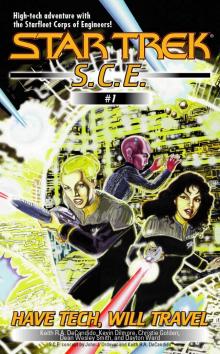 Have Tech, Will Travel
Have Tech, Will Travel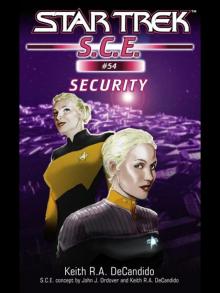 Security
Security